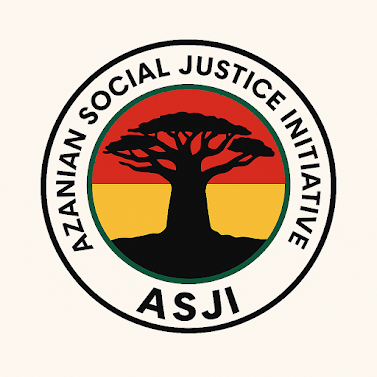The Spark at Five: Fuelling the Flame of Freedom, Charting A New Course with ASJI by Lindokuhle Mponco
East London, South Africa — Five years ago, in the midst of a burst of South African student activism, a fierce fire was lit. It was out of a deep necessity for an independent voice, a voice capable of exploring the structural injustices of our society and challenging the youth to believe for a better future, that the Spark, as a socialist news and analysis website, was born, originally for the students, by the students. In
marking this anniversary, The Spark is not only looking back but is also announcing a major development that will enable it to maintain its critical work of independent journalism while founding a genuinely innovative civic and community organisation – the Azanian Social Justice Initiative (ASJI).
Our origins were modest, stemming from the lecture halls and student common areas where the seeds of critical thinking and group action were planted. During its first two years, The Spark acted as an uncompromising window into campus injustices, ranging from the complicity of academic institutions in larger capitalist structures to exploitative tuition fees and the precarious working conditions of student workers. By proudly elevating the voices of student activists, we helped a generation yearning for change develop a nascent socialist consciousness. We sought to provide students with the knowledge and analytical skills necessary to comprehend and question the status quo through painstaking research and astute analysis.
The last three years have been a crucial period of growth. The Spark bravely expanded its reach by becoming a full-fledged news and analysis platform for workers and students after realising that the problems faced by students were inextricably linked to those of the larger working class. We examined important topics during this time, including the deteriorating conditions of labour rights, the growing housing crisis, the disregard for community health, and the widespread effects of systemic inequality that ensnare our country. By giving marginalised voices—which are frequently muffled by mainstream media—a crucial forum, we have given every day struggles a theoretical foundation and profound analytical insights. Our readership and influence have increased dramatically, reaching over 12,500 readers and penetrating working-class communities outside of academic institutions, demonstrating the greater need than ever for real, radical analysis.
As we commemorate these successes, however, we must face a sobering reality: even the most insightful news and analysis, though vital, cannot bring about the fundamental social change we desire on its own. Even though it is fundamental, a strictly "class-centric" approach needs to change to address the interwoven network of oppressions that shape our reality. The struggles of women, people with disabilities, young people, and everyone else who experiences discrimination on the basis of race, gender, or any other imposed category are inextricably linked to the struggles of the worker.
The creation of the Azanian Social Justice Initiative (ASJI), The Spark's most ambitious leap to date, is fuelled by this understanding. The goal of ASJI, a radical socialist civic and community-based organisation, is to act as a powerful opposition to right-wing, polarising groups like the Solidarity movement and AfriForum. Our goal is very clear: to awaken and educate the masses, especially those who have lost faith in the current political structures, who are still caught up in the politics of compromise and co-optation.
The fundamental goal of ASJI is to inspire revolutionary consensus at the local level. This entails developing a common understanding of systemic problems, a shared aspiration for drastic change, and a strong resolve to take decisive action. Our goal is to accomplish this by:
- Direct outreach and organising in working-class neighbourhoods and marginalised communities: utilising cultural and artistic mediums to spread our messages and create unbreakable solidarity; and organising community forums, popular assemblies, and study circles are all examples of grassroots engagement.
- Developing Dual Power: We acknowledge the necessity of developing alternative organisations and frameworks that contest and eventually supplant current capitalist systems. ASJI will concentrate on creating:
- Mutual Aid Networks: Community food cooperatives, skills-sharing programs, and localized support systems.
- Worker Cooperatives and Alternative Economic Initiatives: Building models of democratic ownership and production.
- Community Defense and Solidarity Networks: Empowering communities to protect themselves and stand in solidarity against oppression.
- People's Assemblies and Local Councils: Fostering direct democratic participation at the community level.
- Arming (Ideologically and Strategically): By providing thorough political education, we will give people the analytical skills and critical awareness they need to spread socialist theory and learn from past conflicts that are pertinent to our current situation. We'll offer tactical direction for both immediate action and long-term planning.
- Mobilizing: We will orchestrate powerful campaigns and coordinated actions on specific issues, building mass movements from the ground up, ensuring that the collective voice of the oppressed resonates loudly and clearly.
- Educating: Beyond formal structures, we will implement popular education initiatives, workshops, and study groups focused on practical organizing and resistance skills, nurturing organic intellectuals from within the heart of our communities.
- Putting the Oppressed Strata/Classes in Order:
- Workers: Constantly supporting workplace organising, unionisation, and worker self-management.
- Peasants (where appropriate): Supporting sustainable farming methods, food sovereignty, and land rights.
- Youth: Educating against capitalism, encouraging youth involvement, and assembling the revolution's future cadres.
- Women: Fighting gender-based violence, empowering women economically, and incorporating feminist movements into a socialist framework.
- People with Disabilities: tenaciously promoting inclusion, accessibility, and opposing the ableism that permeates capitalist structures.
- Students: Continuing to be actively involved in student movements and connecting their challenges to those of the larger working-class movement.
On August 24, 2025, we will proudly announce the new members of ASJI's Founding Committee, marking a new chapter in the fight for true liberation in Azania. We encourage all comrades and concerned citizens to mark this date on their calendars.

Comments
Post a Comment